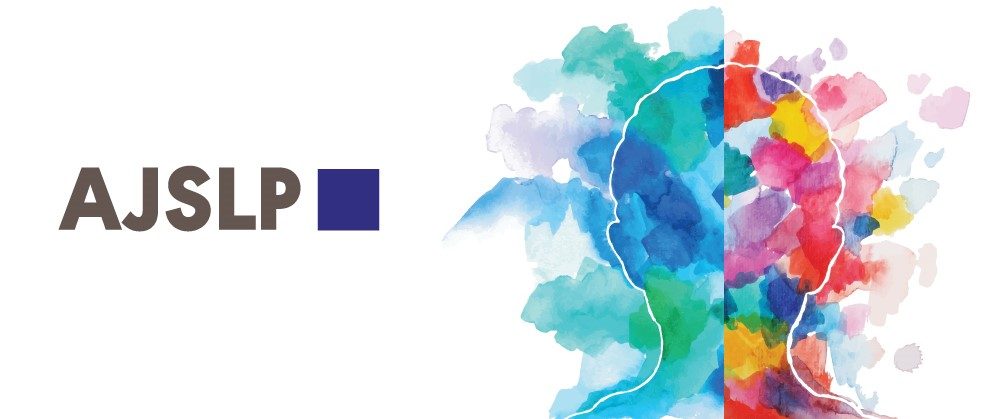Cognitive communication disorders (CCDs) can affect people of all ages in a number of ways. These individuals may experience difficulty relating to and communicating with friends and family, trouble paying attention in class or at work, and even challenges following basic instructions.
Researchers and clinicians working with individuals with CCDs met for the second International Cognitive-Communication Disorders Conference (ICCDC) mere weeks before the global pandemic of COVID-19 hit the United States. Special Issue Editor Margaret Lehman Blake has compiled 11 articles based on presentations at the 2020 ICCDC in the latest issue of the American Journal of Speech-Language Pathology (AJSLP). These articles focus on patients of all ages with CCDs after traumatic brain injury (TBI), concussion, and stroke.
Practical Applications
Blake noted that the ICCDC is important not just for researchers but for clinicians working with patients with CCDs as well. She highlighted three articles in this special issue focusing on practical applications.
Early on in the special issue, Hoepner et al. focus on conversations between people with TBI and their loved ones. Video monitoring helped people with TBI and their communication partners accurately assess their conversations and also resulted in positive gains in conversations for both partners.
In another article, O’Brien et al. focused on peer support for college students following concussion. They found that these students often didn’t have enough information about concussion and would benefit from hearing about other students’ injuries and recoveries. Ultimately, students liked the idea of a mobile application (app) to contain resources and allow them to reach out to mentors.
In the final article that Blake highlighted, Hewetson et al. investigated relationships following a right hemisphere stroke. The authors found that altered communication style, impaired social cognition, and reduced insight and motivation reduced an individual’s social networks following stroke and changed interpersonal relationships.
Other Topics
Two articles in the special issue focused on pediatric and early childhood TBI (Ciccia et al.; Salley et al.), looking at how SLPs support this population and the long-term services that children with TBI need in elementary and middle school. Other articles explore how TBI affects humor (Keegan et al.), the chronic effects of moderate-to-severe TBI (Pettemeridou & Constantinidou), and memory deficits in TBI (D’Angelo et al.). An article by Hardin describes cognitive communication changes in sport-related concussion.
The issue closes with two articles focusing on the future of CCD research. Covington and Duff spotlight methodological advances in other fields and discuss how these advances could be applied to the study of CCDs. The special issue ends with an article by Morrow et al. reexamining graduate education in the area of CCDs.
The Importance of Cognition
This issue is important to professionals throughout the practice of speech-language pathology, Blake explains. “Cognition underlies all aspects of communication . . . . [It] affects everybody across the lifespan.”
We’d like to thank Dr. Blake for her work in putting together this special issue for AJSLP. You can read the special issue here, explore the individual articles below, or find more resources from the ASHA Journals on our TBI Topic Page. We hope that you enjoy this special issue and that you find it applicable to your work with people who have CCDs.
Explore the Special Issue
Ciccia, A., Lundine, J. P., O’Brien, K. H., Salley, J., Krusen, S., Wilson, B., Kunz, J., & Haarbauer-Krupa, J. (2021). Understanding cognitive communication needs in pediatric traumatic brain injury: Issues identified at the 2020 International Cognitive-Communication Disorders Conference. American Journal of Speech-Language Pathology, 30(2S), 853–862. https://doi.org/10.1044/2020_AJSLP-20-00077
Covington, N. V., & Duff, M. C. (2021). Heterogeneity is a hallmark of traumatic brain injury, not a limitation: A new perspective on study design in rehabilitation research. American Journal of Speech-Language Pathology, 30(2S), 974–985. https://doi.org/10.1044/2020_AJSLP-20-00081
D’Angelo, E. C., Ober, B. A., & Shenaut, G. K. (2021). Combined memory training: An approach for episodic memory deficits in traumatic brain injury. American Journal of Speech-Language Pathology, 30(2S), 920–932. https://doi.org/10.1044/2020_AJSLP-20-00075
Hardin, K. Y. (2021). Prospective exploration of cognitive-communication changes with Woodcock–Johnson IV before and after sport-related concussion. American Journal of Speech-Language Pathology, 30(2S), 894–907. https://doi.org/10.1044/2020_AJSLP-20-00110
Hewetson, R., Cornwell, P., & Shum, D. H. K. (2021). Relationship and social network change in people with impaired social cognition post right hemisphere stroke. American Journal of Speech-Language Pathology, 30(2S), 962–973. https://doi.org/10.1044/2020_AJSLP-20-00047
Hoepner, J. K., Sievert, A., & Guenther, K. (2021). Joint video self-modeling for persons with traumatic brain injury and their partners: A case series. American Journal of Speech-Language Pathology, 30(2S), 863–882. https://doi.org/10.1044/2021_AJSLP-20-00074
Keegan, L. C., Suger, C., & Togher, L. (2021). Discourse analysis of humor after traumatic brain injury. American Journal of Speech-Language Pathology, 30(2S), 949–961. https://doi.org/10.1044/2020_AJSLP-20-00059
Morrow, E. L., Turkstra, L. S., & Duff, M. C. (2021). Confidence and training of speech-language pathologists in cognitive-communication disorders: Time to rethink graduate education models? American Journal of Speech-Language Pathology, 30(2S), 986–992. https://doi.org/10.1044/2020_AJSLP-20-00073
O’Brien, K. H., Wallace, T., & Kemp, A. (2021). Student perspectives on the role of peer support following concussion: Development of the SUCCESS peer mentoring program. American Journal of Speech-Language Pathology, 30(2S), 933–948. https://doi.org/10.1044/2020_AJSLP-20-00076
Pettemeridou, E., & Constantinidou, F. (2021). The association between brain reserve, cognitive reserve, and neuropsychological and functional outcomes in males with chronic moderate-to-severe traumatic brain injury. American Journal of Speech-Language Pathology, 30(2S), 883–893. https://doi.org/10.1044/2020_AJSLP-20-00053
Salley, J., Crook, L., Iske, T., Ciccia, A., & Lundine, J. P. (2021). Acute and long-term services for elementary and middle school children with early childhood brain injury. American Journal of Speech-Language Pathology, 30(2S), 908–919. https://doi.org/10.1044/2020_AJSLP-20-00045







